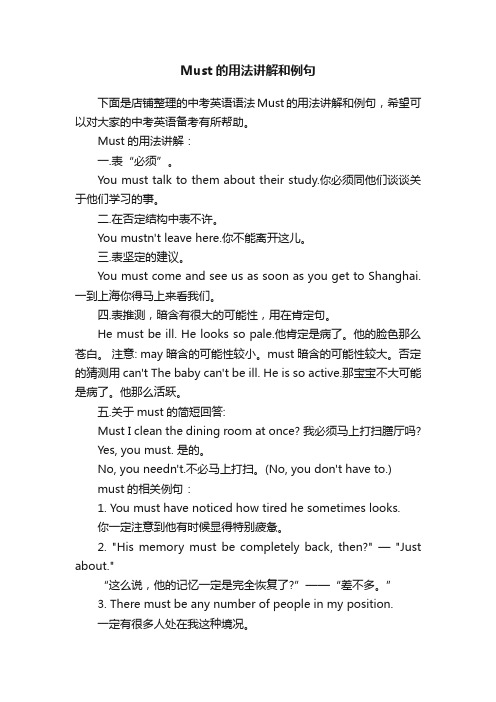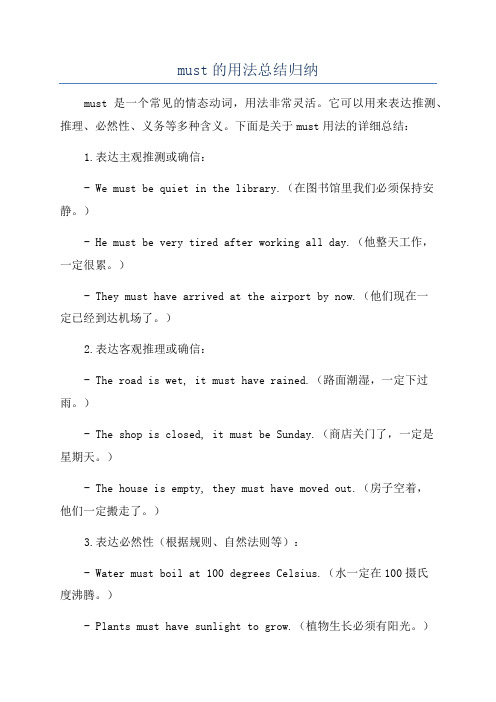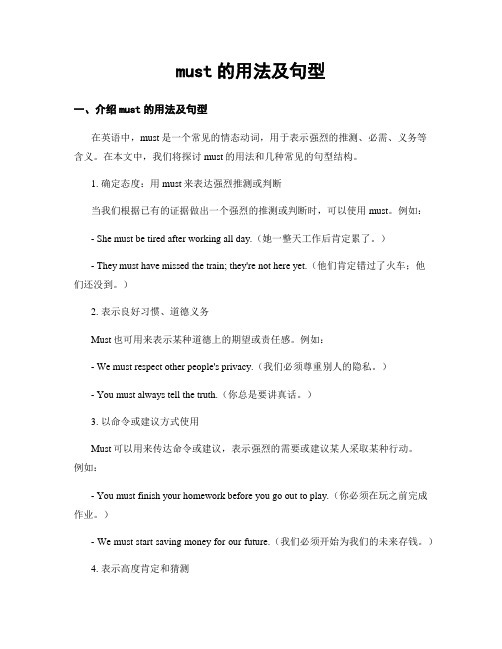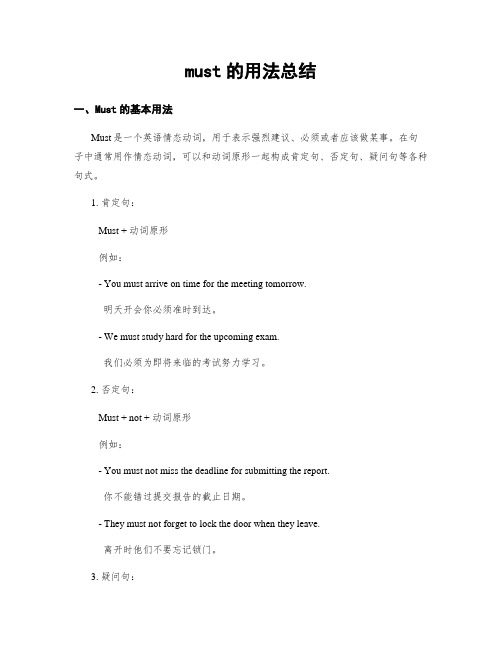must的用法及练习
Must的用法讲解和例句

Must的用法讲解和例句下面是店铺整理的中考英语语法Must的用法讲解和例句,希望可以对大家的中考英语备考有所帮助。
Must的用法讲解:一.表“必须”。
You must talk to them about their study.你必须同他们谈谈关于他们学习的事。
二.在否定结构中表不许。
You mustn't leave here.你不能离开这儿。
三.表坚定的建议。
You must come and see us as soon as you get to Shanghai.一到上海你得马上来看我们。
四.表推测,暗含有很大的可能性,用在肯定句。
He must be ill. He looks so pale.他肯定是病了。
他的脸色那么苍白。
注意: may 暗含的可能性较小。
must 暗含的可能性较大。
否定的猜测用can't The baby can't be ill. He is so active.那宝宝不大可能是病了。
他那么活跃。
五.关于must的简短回答:Must I clean the dining room at once? 我必须马上打扫膳厅吗?Yes, you must. 是的。
No, you needn't.不必马上打扫。
(No, you don't have to.)must的相关例句:1. You must have noticed how tired he sometimes looks.你一定注意到他有时候显得特别疲惫。
2. "His memory must be completely back, then?" —"Just about."“这么说,他的记忆一定是完全恢复了?”——“差不多。
”3. There must be any number of people in my position.一定有很多人处在我这种境况。
must的用法总结归纳

must的用法总结归纳must是一个常见的情态动词,用法非常灵活。
它可以用来表达推测、推理、必然性、义务等多种含义。
下面是关于must用法的详细总结:1.表达主观推测或确信:- We must be quiet in the library.(在图书馆里我们必须保持安静。
)- He must be very tired after working all day.(他整天工作,一定很累。
)- They must have arrived at the airport by now.(他们现在一定已经到达机场了。
)2.表达客观推理或确信:- The road is wet, it must have rained.(路面潮湿,一定下过雨。
)- The shop is closed, it must be Sunday.(商店关门了,一定是星期天。
)- The house is empty, they must have moved out.(房子空着,他们一定搬走了。
)3.表达必然性(根据规则、自然法则等):- Water must boil at 100 degrees Celsius.(水一定在100摄氏度沸腾。
)- Plants must have sunlight to grow.(植物生长必须有阳光。
)- You must wear a seatbelt when driving.(开车时必须系安全带。
)4.表达义务、强制或责任:- We must follow the rules.(我们必须遵守规定。
)5.表示建议或命令:- You must read this book, it's really interesting.(你必须读这本书,它非常有趣。
)- You must stop smoking for your health.(为了健康,你必须戒烟。
)6.表达事实或不可怀疑:- It must be cold outside, everyone is wearing coats.(外面一定很冷,大家都穿着外套。
must的用法及句型

must的用法及句型一、介绍must的用法及句型在英语中,must是一个常见的情态动词,用于表示强烈的推测、必需、义务等含义。
在本文中,我们将探讨must的用法和几种常见的句型结构。
1. 确定态度:用must来表达强烈推测或判断当我们根据已有的证据做出一个强烈的推测或判断时,可以使用must。
例如:- She must be tired after working all day.(她一整天工作后肯定累了。
)- They must have missed the train; they're not here yet.(他们肯定错过了火车;他们还没到。
)2. 表示良好习惯、道德义务Must也可用来表示某种道德上的期望或责任感。
例如:- We must respect other people's privacy.(我们必须尊重别人的隐私。
)- You must always tell the truth.(你总是要讲真话。
)3. 以命令或建议方式使用Must可以用来传达命令或建议,表示强烈的需要或建议某人采取某种行动。
例如:- You must finish your homework before you go out to play.(你必须在玩之前完成作业。
)- We must start saving money for our future.(我们必须开始为我们的未来存钱。
)4. 表示高度肯定和猜测在对某种情况或可能性表示高度肯定或推测时,must可以用来加强语气。
例如:- It must be difficult for her to adapt to a new environment.(她必须很难适应新环境。
)- He can't find his keys. He must have left them at home.(他找不到钥匙了。
他必须把它们丢在家里了。
must的用法及练习

must的用法及练习情态动词must 的用法1.must 表示必要性,“必须”(肯定句,疑问句常见)Must I start at once?例题你必须现在睡觉。
_________________.2.否定式mustn’t 表示“禁止”例题不许我们再迟到了。
_________________3.由must 引导一般疑问句时,肯定回答用must,否定回答用needn’t或don’t have to.---- Must I stay at home?---- Yes, you ___ / No, you _________________.4.当出现反问句式时,如果其陈述部分must 表示“必须,有必要”时,反问句用needn’t,如果其陈述部分mustn’t 表示“禁止”,反问句用must.例题①----You must go there, ______you?---- Yes, I must. / No, I needn’t/don’t have to.②You mustn’t go there, _________you?5.must 表示推测时,有3种形式时,反问句与must 后的动词保持一致。
⑴对现在的动作进行推测①You must be hungry now, aren’t you?②You must have the wrong number. There is no such person, haven’t/don’t you?⑵对正在进行的动作进行推测He must be doing his homework, isn’t he?⑶对过去发生的动作进行推测①You must have read this book, haven’t you?②It must have snowed yesterday, didn’t you?6.must 用于反语,表示劝诫。
-----Must you make so much noise?(你非得吵这么大声吗?) -----Sorry, I’ll try not to.例题John, look at the time, ___ you play the piano at such a later hour?A. mustB. canC. mayD. need7.与说话人的愿望相反,“偏偏,偏巧”。
must的用法总结

must的用法总结一、Must的基本用法Must是一个英语情态动词,用于表示强烈建议、必须或者应该做某事。
在句子中通常用作情态动词,可以和动词原形一起构成肯定句、否定句、疑问句等各种句式。
1. 肯定句:Must + 动词原形例如:- You must arrive on time for the meeting tomorrow.明天开会你必须准时到达。
- We must study hard for the upcoming exam.我们必须为即将来临的考试努力学习。
2. 否定句:Must + not + 动词原形例如:- You must not miss the deadline for submitting the report.你不能错过提交报告的截止日期。
- They must not forget to lock the door when they leave.离开时他们不要忘记锁门。
3. 疑问句:Must + 主语 + 动词原形?例如:- Must we finish this task by tomorrow?我们必须明天完成这项任务吗?- Must I bring my own laptop to the workshop?我必须带自己的笔记本电脑参加研讨会吗?二、Must的用法总结1. 表示根据道德规范或者法律规定必须做或者不做某事。
例如:- You must obey the rules of the library.你必须遵守图书馆的规定。
- Citizens must pay taxes on time.公民必须按时缴纳税款。
2. 表示根据逻辑、常识或者经验判断,某种行为是非常确凿的真理或者必然的结果。
例如:- The sun must rise in the east and set in the west.太阳肯定从东方升起,西方落下。
- You must be tired after working for such a long time.在工作了这么长时间之后,你一定累了。
情态动词must的用法例句

情态动词must的用法例句一、情态动词must的基本用法情态动词must是英语中常见的一个情态动词,用于表示强烈的义务、责任或必要性。
它一般后面接动词原形,用于肯定句中,表示说话人认为某事是非常重要或必须要做的。
下面将通过一些例句来详细解释must的不同用法。
二、表达义务和责任1. We must pay our bills on time.我们必须按时付账单。
2. You must finish your homework before going out to play.你在出去玩之前必须完成作业。
3. They must attend the meeting this afternoon.他们这个下午必须参加会议。
4. I must apologize for my mistake.对于我的错误,我必须道歉。
三、表达推测和确定观点除了表达义务和责任,must还可以用于推测和确定观点。
它可以表示说话人根据自己的判断或根据现有证据得出结论。
下面是一些例句:1. He's been studying every day, so he must be well-prepared for the exam.他每天都在学习,所以他一定为考试做好了充分准备。
2. The weather is getting colder and darker, it must be winter soon.天气越来越冷暗了,冬天应该快到了。
3. The train is usually punctual, so it must have arrived by now.火车通常是准点的,所以它现在应该已经到站了。
4. She's been practicing the piano for hours every day, so she must be getting better.她每天练习钢琴几个小时,所以她肯定在进步。
must的用法及短语

must的用法及短语一. must的用法1. must作为助动词,表示强烈的义务或需要,常用于肯定句中。
例如:- You must submit your assignment by Friday.(你必须在星期五前提交你的作业。
)- We must always follow the safety instructions.(我们必须始终遵守安全说明。
)2. must可以用于表示推测或断定某事是非常可能发生的。
例如:- It's midnight, and she's not home yet. She must be stuck in traffic.(现在已经半夜了,而她还没回家。
她一定被堵在交通堵塞里了。
)- He hasn't eaten anything all day. He must be starving.(他整天都没有吃东西。
他一定饿坏了。
)3. 在过去的时态中,must有两种形式:must和had to。
- must用于表达过去时态中主观的推测、肯定意愿或授权。
例:He said his parents and sister would visit him that day, so he knew he must clean his apartment.他说他父母和姐姐可能那天会来看望他,所以他知道自己得打扫公寓。
- had to用于表达过去时态中不由选择、不得不做某事。
例:I had no other option but to ride my bike to work when my car broke down.我的车坏了,我别无选择只能骑自行车上班。
二. must的常用短语1. must-see:必看的- The Grand Canyon is a must-see if you're ever in Arizona.(如果你曾经在亚利桑那州,大峡谷是必看的)- My friend recommended a must-see movie that just came out in theaters.(我的朋友推荐了一部最新上映并值得一看的电影。
must的用法及例句

must的用法及例句一、must的用法must是一个情态动词,用于表示强烈的义务、必要性和推断。
在英语中,我们常常使用must来表达对某事的肯定判断或假设。
下面将介绍must的用法,并给出一些例句以帮助理解。
1. 表示强制性的义务Must可以用来表达人们必须遵守或执行的法律、规则或规定。
它传达了一种强烈程度,并暗示没有其他选择。
例句:- You must wear a seatbelt while driving.你开车时必须系安全带。
- Students must complete their homework by tomorrow.学生们必须在明天之前完成作业。
2. 表示强烈推测或相当确定Must还可以用来表达对某事物非常有把握、认为几乎肯定会发生的推断。
例句:- The weather is so sunny. It must be a perfect day for a picnic.天气这么晴朗,很可能是个适合野餐的好日子。
- He has been studying all night long, so he must pass the exam.他整晚都在学习,所以他应该会通过考试。
3. 表示客观存在和真实性Must也可用于陈述某种客观现实、规律或普遍真理。
例句:- Water boils at 100 degrees Celsius. (Boiling point of water)水在摄氏100度时沸腾。
(水的沸点)- You must trust yourself before others can trust you.别人信任你之前,你必须要相信自己。
4. 表示对现在和过去发生的事物的猜测Must还可用于推测已经发生或正在发生的事情。
例句:- The door is wide open. Someone must have forgotten to close it.门敞开着,一定是有人忘记关上了。
- 1、下载文档前请自行甄别文档内容的完整性,平台不提供额外的编辑、内容补充、找答案等附加服务。
- 2、"仅部分预览"的文档,不可在线预览部分如存在完整性等问题,可反馈申请退款(可完整预览的文档不适用该条件!)。
- 3、如文档侵犯您的权益,请联系客服反馈,我们会尽快为您处理(人工客服工作时间:9:00-18:30)。
情态动词must 的用法
1.must 表示必要性,“必须”(肯定句,疑问句常见)
Must I start at once?
例题
你必须现在睡觉。
_________________.
2.否定式mustn’t 表示“禁止”
例题
不许我们再迟到了。
_________________
3.由must 引导一般疑问句时,肯定回答用must,否定回答用
needn’t 或don’t have to.
---- Must I stay at home?
---- Yes, you ___ / No, you _________________.
4.当出现反问句式时,如果其陈述部分must 表示“必须,有必要”
时,反问句用needn’t,如果其陈述部分mustn’t 表示“禁止”,反问句用must.
例题
① ----You must go there, ______you?
---- Yes, I must. / No, I needn’t/don’t have to.
② You mustn’t go there, _________you?
5.must 表示推测时,有3种形式时,反问句与must 后的动词保持
一致。
⑴对现在的动作进行推测
①You must be hungry now, aren’t you?
②You must have the wrong number. There is no such person,
haven’t/ don’t you?
⑵对正在进行的动作进行推测
He must be doing his homework, isn’t he?
⑶对过去发生的动作进行推测
① You must have read this book, haven’t you?
②It must have snowed yesterday, didn’t you?
6.must 用于反语,表示劝诫。
-----Must you make so much noise?(你非得吵这么大声吗?)
-----Sorry, I’ll try not to.
例题
John, look at the time, ___ you play the piano at such a later hour?
A. must
B. can
C. may
D. need
7.与说话人的愿望相反,“偏偏,偏巧”。
友情提示:本资料代表个人观点,如有帮助请下载,谢谢您的浏览!。
